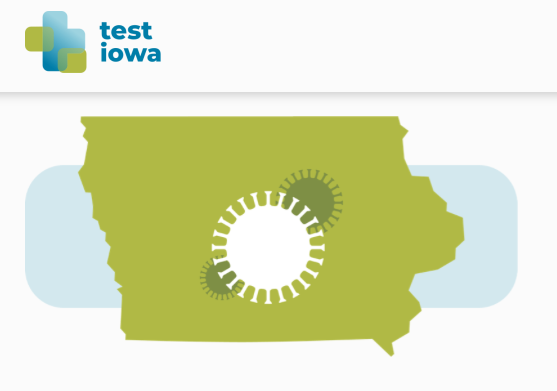An attorney representing the board chair of the Salt Lake Tribune has sued the Iowa Department of Public Health (IDPH) and its records custodian for failing to provide email correspondence related to the $26 million Test Iowa program.
Paul Huntsman confirmed on July 30 that the lawsuit Suzette Rasmussen filed in Polk County the previous day is part of his Jittai initiative. The Tribune’s board chair recently created Jittai in order “to learn more about TestUtah and its sister programs” created through similar no-bid contracts in Iowa, Tennessee, and Nebraska. Florida also implemented parts of the program.
According to the court filing, which is posted in full below, Rasmussen wrote to Sarah Ekstrand in March seeking “copies of all correspondence between the Iowa Department of Public Health, including but not limited to Interim Director Kelly Garcia, and the Iowa Governor’s Office, Utah state officials, Nebraska state officials, and Tennessee state officials regarding the Test Iowa Contract” from March 1, 2020 to March 11, 2021.
The lawsuit claims Ekstrand told Rasmussen on April 14 “that she anticipated having the Request fulfilled within five days.” Instead, months passed as Ekstrand asked for more details about the search terms to be used, and Rasmussen repeatedly emailed to ask about the status of her request.
Although Ekstrand reportedly indicated on July 20 “the Records were in final review and she anticipated being able to release them soon,” the IDPH has yet to provide the emails, the lawsuit states.
Rasmussen’s court filing asserts that IDPH and Ekstrand “have failed to comply” with Iowa’s open records law, known as Chapter 22, and “have waived any claims of privilege or confidentiality” in the Test Iowa emails. The plaintiff is asking the District Court to require the agency to produce the records and cover legal costs and attorney fees.
Huntsman told Bleeding Heartland via email,
We’ve found a troubling pattern among testutah/testiowa/testnebraska/testtn (and Florida as well) program where the results have been concealed and the data that has been released is very troubling. We didn’t want to have to litigate but we were forced to do so in Iowa, Utah and Nebraska.
What has been released thus far is a small fraction of what we’ve uncovered. We believe the public and current policy makers need the truth in order to make the best decisions possible, particularly in light of the delta variant.
The records at issue in the Nebraska lawsuit relate to “the makeup of the diagnostics tests [Test Nebraska] received from Nomi Health.” The Utah lawsuit challenges “an additional layer of review” imposed in 2020 for COVID-19 related documents. That process, which runs requests to other agencies through the governor’s office, has caused delays that violate timelines laid out under Utah’s open records law.
Iowa Code Chapter 22 sets no deadlines for release of public records but states that “a reasonable delay” for determining whether a record should be withheld as confidential “shall not exceed twenty calendar days and ordinarily should not exceed ten business days.”
Ekstrand and Assistant Attorney General Heather Adams, who represents the IDPH, did not reply to an email seeking comment on the lawsuit.
Many Iowa news organizations have similarly struggled to obtain COVID-19 related records from IDPH, sometimes having to follow up many times over several months. The governor’s office has ignored numerous records requests since the pandemic began; some requests that were never fulfilled date to April 2020.
Clark Kauffman of Iowa Capital Dispatch and I have filed complaints with the Iowa Public Information Board over IDPH’s handling of some of our records requests. However, the board charged with enforcing Iowa’s open records law has no jurisdiction over the governor’s office.
UPDATE: Ekstrand told Bleeding Heartland on July 31, “the agency does not comment on pending litigation, and we have not been served with the lawsuit you mention.”
Lawsuit filed in Polk County District Court on July 29:


No Comments